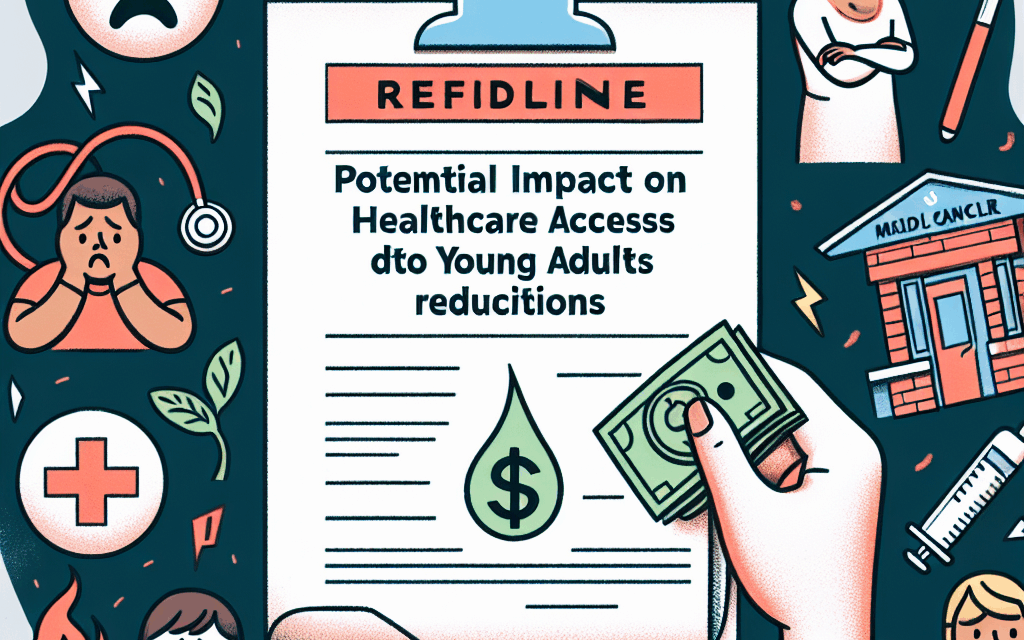Medicaid Reductions May Endanger Healthcare Access for Young Adults: Report
The landscape of healthcare in the United States is constantly evolving, with policies and funding mechanisms significantly impacting access to care. One of the most critical programs in this regard is Medicaid, which provides essential health coverage to millions of low-income individuals, including young adults. Recent reports indicate that proposed reductions in Medicaid funding could severely jeopardize healthcare access for this vulnerable demographic. This article delves into the implications of these reductions, exploring the potential consequences for young adults, the broader healthcare system, and society as a whole.
The Importance of Medicaid for Young Adults
Medicaid serves as a lifeline for many young adults, particularly those who are transitioning from adolescence to adulthood. This demographic often faces unique challenges, including entering the workforce, pursuing higher education, and managing financial independence. Understanding the role of Medicaid in supporting young adults is crucial for grasping the potential impact of funding cuts.
- Coverage for Low-Income Individuals: Medicaid provides health insurance to individuals and families with limited income. For young adults, this often means access to necessary medical services that they might otherwise forgo due to cost.
- Preventive Care: Medicaid emphasizes preventive care, which is vital for young adults who may be at risk for various health issues. Regular check-ups, vaccinations, and screenings can help catch potential problems early.
- Mental Health Services: Young adults are particularly vulnerable to mental health issues. Medicaid covers mental health services, which are essential for this age group, especially in the wake of the COVID-19 pandemic.
- Substance Abuse Treatment: With rising rates of substance abuse among young adults, Medicaid plays a critical role in providing access to treatment programs and rehabilitation services.
- Support for Chronic Conditions: Many young adults live with chronic conditions that require ongoing medical attention. Medicaid ensures that they receive the necessary care to manage these conditions effectively.
In summary, Medicaid is not just a safety net; it is a critical component of the healthcare system that supports young adults in various aspects of their lives. Reductions in funding could dismantle this support, leading to dire consequences.
Potential Consequences of Medicaid Reductions
The proposed reductions in Medicaid funding could have far-reaching consequences for young adults. These consequences extend beyond individual health outcomes and can affect families, communities, and the healthcare system as a whole.
- Increased Uninsured Rates: A reduction in Medicaid funding could lead to higher uninsured rates among young adults. Without access to affordable healthcare, many may delay seeking medical attention, leading to worsened health outcomes.
- Financial Burden on Families: Young adults often rely on their families for financial support. If they lose Medicaid coverage, families may face increased healthcare costs, straining their financial resources.
- Impact on Mental Health: The stress of losing healthcare access can exacerbate mental health issues among young adults. The uncertainty surrounding their health coverage can lead to anxiety and depression.
- Increased Emergency Room Visits: Without access to preventive care, young adults may resort to emergency rooms for treatment, which is more costly and less effective than regular care.
- Long-Term Health Consequences: Delayed treatment and lack of preventive care can lead to chronic health issues that persist into adulthood, creating a cycle of poor health and increased healthcare costs.
These potential consequences highlight the urgent need to consider the implications of Medicaid funding cuts on young adults. The ripple effects can be profound, affecting not just individuals but also families and communities.
Case Studies: Real-Life Impacts of Medicaid Reductions
To better understand the implications of Medicaid reductions, examining real-life case studies can provide valuable insights. These examples illustrate how cuts to Medicaid can directly affect young adults and their access to healthcare.
- Case Study 1: The Impact of the 2017 Medicaid Cuts in Texas – In 2017, Texas implemented significant cuts to its Medicaid program. Young adults reported increased difficulty accessing mental health services, leading to a rise in untreated mental health issues. Many were forced to rely on emergency services, which further strained the healthcare system.
- Case Study 2: The Expansion of Medicaid in Kentucky – Kentucky expanded Medicaid under the Affordable Care Act, resulting in a significant decrease in uninsured rates among young adults. However, proposed reductions threaten to reverse these gains, potentially leading to increased rates of chronic illness and mental health issues.
- Case Study 3: The Effects of Medicaid Cuts on Young Adults with Disabilities – Young adults with disabilities often rely on Medicaid for essential services. Reductions in funding have led to decreased access to necessary therapies and support services, impacting their ability to live independently and pursue education or employment.
- Case Study 4: The Role of Medicaid in Preventive Care – A study in California showed that young adults enrolled in Medicaid were more likely to receive preventive care services, such as vaccinations and screenings. Cuts to Medicaid could reverse these trends, leading to increased rates of preventable diseases.
- Case Study 5: The Long-Term Effects of Medicaid Reductions on Health Outcomes – Research indicates that young adults who lose Medicaid coverage are more likely to experience long-term health issues, including chronic diseases and mental health disorders. This not only affects their quality of life but also increases healthcare costs for society as a whole.
These case studies underscore the real-world implications of Medicaid reductions, illustrating how policy changes can have profound effects on the health and well-being of young adults.
Policy Recommendations to Protect Young Adults
Given the potential dangers posed by Medicaid reductions, it is essential to consider policy recommendations that can help protect young adults’ access to healthcare. These recommendations aim to ensure that young adults continue to receive the support they need.
- Maintain and Expand Medicaid Funding: Policymakers should prioritize maintaining and expanding Medicaid funding to ensure that young adults have access to necessary healthcare services.
- Enhance Preventive Care Services: Expanding preventive care services within Medicaid can help address health issues before they become severe, ultimately reducing long-term healthcare costs.
- Increase Access to Mental Health Services: Given the rising rates of mental health issues among young adults, it is crucial to enhance access to mental health services through Medicaid.
- Implement Outreach Programs: Increasing awareness of Medicaid services and eligibility can help ensure that young adults take advantage of available resources.
- Support for Young Adults with Disabilities: Tailoring Medicaid services to better support young adults with disabilities can help them achieve greater independence and improve their quality of life.
These policy recommendations can help mitigate the negative impacts of Medicaid reductions and ensure that young adults continue to receive the healthcare support they need.
The Broader Implications for Society
The potential reductions in Medicaid funding for young adults extend beyond individual health outcomes; they have broader implications for society as a whole. Understanding these implications is crucial for grasping the full impact of policy changes.
- Economic Impact: Increased healthcare costs due to untreated conditions can strain public resources and lead to higher insurance premiums for everyone. A healthier population contributes to a more productive workforce.
- Social Stability: Access to healthcare is a fundamental aspect of social stability. When young adults lack access to necessary services, it can lead to increased social unrest and dissatisfaction with the healthcare system.
- Impact on Future Generations: Young adults are the future of society. If they face health challenges due to lack of access to care, it can have long-term consequences for future generations, including increased healthcare costs and decreased productivity.
- Public Health Outcomes: A population with limited access to healthcare is more susceptible to public health crises. Ensuring that young adults have access to care can help mitigate the spread of diseases and improve overall public health outcomes.
- Equity in Healthcare: Reductions in Medicaid funding disproportionately affect marginalized communities. Ensuring equitable access to healthcare is essential for fostering a just society.
These broader implications highlight the interconnectedness of healthcare access and societal well-being. Protecting Medicaid funding for young adults is not just a matter of individual health; it is a critical issue that affects us all.
Conclusion
The potential reductions in Medicaid funding pose a significant threat to healthcare access for young adults. As this article has explored, the implications of these cuts extend far beyond individual health outcomes, affecting families, communities, and society as a whole. Young adults rely on Medicaid for essential services, including preventive care, mental health support, and treatment for chronic conditions. The case studies presented illustrate the real-world impacts of funding cuts, emphasizing the urgent need for policy interventions to protect this vulnerable demographic.
By maintaining and expanding Medicaid funding, enhancing preventive care services, and increasing access to mental health resources, policymakers can help ensure that young adults continue to receive the support they need. The broader implications for society underscore the importance of equitable healthcare access, highlighting that the health of young adults is intrinsically linked to the health of our communities and future generations.
In summary, the stakes are high. Protecting Medicaid funding is not just a policy issue; it is a matter of social justice and public health. As we move forward, it is essential to advocate for policies that prioritize the health and well-being of young adults, ensuring that they have the resources they need to thrive.





